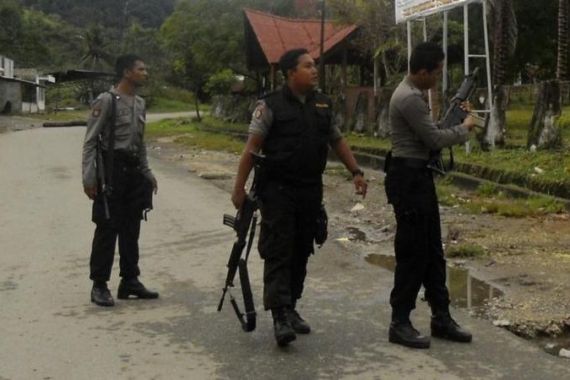Rights groups slam police for Papua death
Shops remained closed on Friday after prominent independence activist’s killing leads to unrest in Indonesian province.

Human rights activists have slammed Indonesian police for the killing of a prominent Papuan independence leader who was allegedly involved in a series of mysterious shootings.
Authorities said on Thursday that Mako Tabuni, deputy chairman of secessionist West Papua National Committee (KNPB), was armed when shot by police as he tried to escape a raid in the town of Waena near the provincial capital Jayapura.
“Even if he resisted arrest and tried to escape, police should not have shot him to death. As far as we know the KNPB is not an armed group,” said Ifdhal Kasim, head of the government-backed National Human Rights Commission, said on Friday.
He told reporters his group, the country’s top rights body, would investigate whether police followed proper procedures before opening fire on the activist.
“If police suspected Tabuni to be behind all the shootings they should not have killed him. They should have proven the allegations,” said Poengki Indarti of Imparsial, an independent human rights group.
KNPB spokesman Warpo Wetipo said that according to witness accounts Tabuni was unarmed and police kept shooting at him even after he was down with gunshots to his leg.
The incident ignited a wave of anger among residents in Waena, who set homes and cars ablaze on Thursday.
“It is safe and quiet now. There are many troops on the streets,” Papua police chief Bigman Lumban Tobing said.
He said police detained three people and seized several handmade bombs, machetes, arrows, separatist flags and documents during a raid in a student dormitory in Jayapura, the capital of the province.
Shops were closed on Friday, and many people were afraid to leave their homes.
Low-level insurgency
A low-level insurgency in the province remains an extremely sensitive issue for the government, which restricts access to foreign journalists, human rights workers and academics, making it difficult to verify claims of abuses.
Tobing said Tabuni was shot when police tried to arrest him near Waena housing complex in Jayapura, He said Tabuni fought back and grabbed a weapon from an officer before he was shot, and that he died hours later at a hospital.
Tobing said Tabuni was suspected in a recent spate of attacks in the province. He said 16 people, including seven soldiers and police, have been killed in different places in Papua since last month. Four were pro-independence activists.
Human Rights Watch, however, says the military is responsible for some of the violence. The New York-based group said the government is failing to adequately investigate the killings, and is preventing rights monitors and journalists from going to Papua to see for themselves.
“Allowing full access to the province for UN rights experts and the press could curtail the rumors and misinformation that often fuel abuses,” Elaine Pearson, Human Rights Watch’s deputy Asia director, said in a statement Wednesday.
President Susilo Bambang Yudhoyono has conceded that Indonesian security forces have overreacted at times but said the attacks were “on a small scale with limited victims.”
Tobing said that following Tabuni’s death, a crowd of protesters went on a rampage in Jayapura, many of them were carrying machetes and arrows. Police said most of those injured or killed in Thursday riot were settlers from elsewhere in Indonesia.
Papua, a former Dutch colony in the western part of New Guinea, was incorporated into Indonesia in 1969 after a UN-sponsored ballot. A small, poorly armed separatist group known as the Free Papua Movement has battled for independence since then.
Four people had been arrested in the past two weeks over a spate of violence in the region, including the fatal shooting of a German tourist late last month.